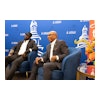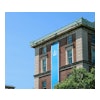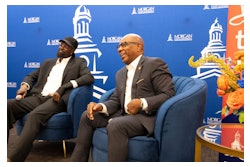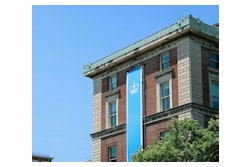HAVANA
Eight American students graduated from a Cuban medical
school on Tuesday and said they planned to put six years of education paid for
by Fidel Castro’s communist government to use in hospitals back home.
Four New Yorkers, three Californians and a Minnesota
native, all from minority backgrounds, have studied in Havana
since April 2001. They were the first class of Americans to graduate from the
Latin American School of Medicine since Castro offered free training to U.S.
students after meeting with members of the Congressional Black Caucus seven
years ago.
“I’ve learned that medicine is not a business,”
said Toussaint Reynolds, a graduate from Massapequa,
New York. “I will be a better doctor
in the United States
for it.”
The 80-year-old Castro has not been seen in public since
last July 31, when he announced that emergency intestinal surgery was forcing
him to step down in favor of a provisional government headed by his younger
brother Raul.
On Tuesday, about 2,100 students from 25 countries graduated
from the medical school, including some 1,200 medical doctors, as well as
dentists, nurses and medical technicians. More than 10,000 students attend the
school that opened in 1999 to provide free training to foreign students from
disadvantaged families.
Washington’s
45-year-old embargo prohibits most Americans from traveling to CubaU.S.
policy hopes to encourage contact between ordinary Cubans and Americans.
and chokes off nearly all trade between the countries. But the U.S. State
Department has not opposed the medical school program, saying
U.S.
authorities have suggested it is unclear whether Americans who receive medical
training in Cuba
can meet licensing requirements in the United
States. The graduates must pass two exams to
apply for residency at U.S.
hospitals, and then a third test, much like students who received medical
degrees in other countries.
While the six U.S.
women and two men who graduated Tuesday are the first graduating class of Americans,
one U.S.
student who began studying in America
then transferred to the Cuban school graduated two years ago. He recently began
his residency at a hospital in New York City.
Kenya Bingham, who graduated Tuesday and is from Alameda,
California, said some might think less of a
Cuban medical degree.
“Do I think there will be prejudices against us when we
go back to the states and are looking for residences? Yes, I think there will
be just due to the simple fact that there are political differences between the
two countries,” Bingham said. “But I’m definitely confident that the
eight of us are very well prepared clinically.”
The U.S.
graduating class consisted of six women and two men.
The Rev. Lucius Walker, of the U.S. nonprofit Pastors for Peace, has worked closely with
the graduating U.S. students and said that about 100 other Americans are
enrolled at the school, and another 18 are scheduled to start next month.
– Associated Press
© Copyright 2005 by DiverseEducation.com


















